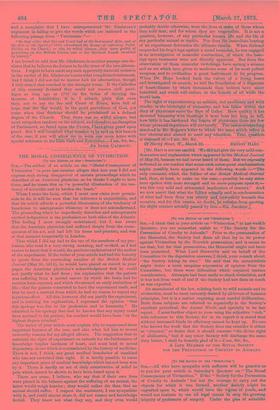THE MORAL CONSEQUENCE OF VIVISECTION. fro TEE EDITOSIOr vils '&8FROTATORM.:
SIR,—The author of an article.on the Maka,a1Ronsequence of Vivisection" in your last number alleges thak -last.* year I'-did not -express such strong disapproval of certain. proceedings which he describes of RH American physician-as he-- thinks I Ought to have done; .and-tke:treats this as -",s, , powerful illustration of the ten- dency of scientific zeal to harden the heart."
When:I.:state-the facts; which I must- sow claim /oar permie-
sionto do, it willbe seen that his inference is unjustifiable, and that his article affords a powerful-illustration of the tendency of fanaticism to misrepresent whatever- it does not misunderstand. The proceeding which he imperfectly describes and misrepresents excited indignation in the profession on both sides of the Atlantic. This feeling I most strongly entertained, but I was aware that the American physician had suffered deeply from the conse- quences of his act, and had left his home and practice, and was at that moment temporarily in London.
That which I did say had to the-eye of the members of my pro- fession who read it a very strong meaning, and evoked, as I had reason to know that it would, the penitent explanation of the author of the experiment. If the writer of your article had had the -honesty to quote from the succeeding number of the British Medical Journal (May 30, 1874), he would have placed on record in your pages the American physician's acknowledgment that he could not justify what he had done ; his explanation that the patient was suffering from a mortal- cancer by which the brain had for months been exposed, and which threatened an early extinction of life ; that the patient consented to have the experiment made, and that he used a current from which he had no reason to expect any injurious effect. All this, however, did not justify the experiment, and in noticing his explanation, I expressed the opinion "that this apology was due to his profession and to humanity." He admitted in his apology that had he :known that any injury could have accrued to his patient, his conduct would have been "in the highest degree criminal."
The writer of your article must explain why he suppressed these important features of the case, and also what led him to invent unworthy reasons for my alleged silence. The suggestion that to maintain the right of experiment on animals for the furtherance of knowledge implies hardness of heart, and must lead to moral degeneracy, is one which is contradicted by the history of medicine. There is not, I think, any great medical benefactor of mankind who has not exercised that right. It is hardly possible to name any important piece of medical knowledge which has not been won by it. There is hardly an act of daily ministration of relief to pain which cannot be shown to have been based, upon it.
There are some, I believe, who any that if their own lives were placed in the balance against the suffering of au animal, the latter would weigh heavier; they would rather die than that an animal should suffer. I respect the sentiment, I can sympathise with it, and could almost share it, did not reason and knowledge forbid. They know not what they say, and they even would
probably decide otherwise, were the lives at stake of those whons they hold'dear, and for whom they are responsible. It is not a. question,' however, of any particular human life and the 14e of any partieular animal or reptile. Nor 'does the immediate bearing. of an experiment determine the ultimate' results. When Calvaiti. suspended his frog's legs against a. inetalierandah, he was engaged: in aninvestigation of muscular contraction, of which the bear- ings upon treatment were not directly apparent. But from the observation of thotte "nituactilar tVritchitige have spiting a science- and an art which have given to medicine some of its most potent weapons, and to civilisation a great instrument in its ,progress. When DE. Hope' hooked hack the 'valves of a living heart and investigated its sounds, he laid the -foundation of alf4nosis Of heart-disease by which thousands then unborn ii104. since benefited; and whieh will endure to the benefit of the- world lasts.
' The right of experimenting on animals, not ire' y and with crueltY,Iiithe birthright of humanity, and bait i.0131LV-iithin the cintY of lhys1cians since the ' dap of Galen. HOW qufl it deVieritlilithilitnity*Itlitlpittift41" were here too lat heir littVit "fh ahAlits Of •ghisiciEMI tile% 'Yen hostiy°The
:the
fitioiVediiiqiWRogeidslaitRIONiulliAlke'same ete').4113111 absurd to need ' anY'attention. s ,0 if a of gildiaird'df.14I am," Sir; . als,-)11 IiilL 00.2 4tilit4T4 Street, W.,_March._23.
marten T.
[Mr. Hart is not the otaidid 7.15re dldifulfikilia the very mild con- demnation and explanation-which appeared initificMedical Journal' Of May'.S.%.beeaueetre had never heard:cif -thein: But -we expressly indicated,re our readers that sometsieli subsequent condemnation might_ NofiSibly, hate appeared. following Words only comment 1 which the' Editor-dathe British Mediietiviriantat' had, then,' at least, to make-53n homay since have. spoken with more strengtli-andto-niore purpose upon was this very mild and atteunatixt implication of censure." And we now assert that what the Edit,or agtaal]1y,saidin condemnation of what had been done was utterly atat-tinvierthily beneath the occasion,. and for this reason, no doubt, he refrains from quoting. the slight censure actually passed by him.—En. Soectatoi-.]


































 Previous page
Previous page